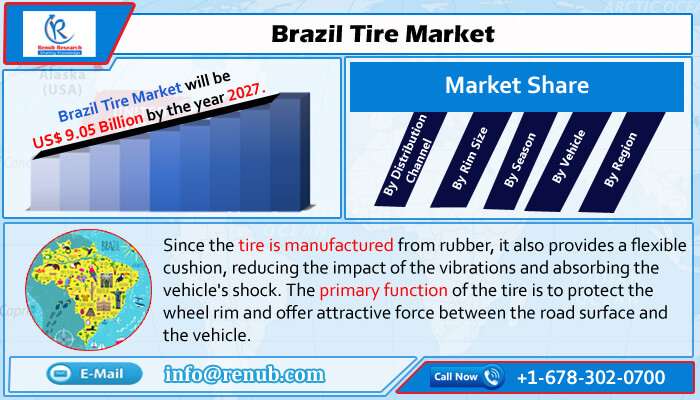Brazil Tire Market to reach US$ 9.05 Billion by 2027, Propelled by Increasing Per Capita Income and the Growing Demand for Automobiles
14 Jan, 2022
According to the report by Renub Research, titled “Brazil Tire Market, Size, Forecast 2022-2027, Industry Trends, Share, Growth, Impact of COVID-19, Opportunity Company Analysis” the Brazil Tire Market Size reached US$ 6.29 Billion in 2021. Brazil is home to one of the most pre-eminent automotive markets, including tire is the significant component of a vehicle interacting with the road. In terms of annual new registrations, the characteristics of tires mainly influence the performance of a vehicle. Tires affect a vehicle's traction, handling, ride comfort, and fuel consumption. A tire is a ring-shaped component surrounding a wheel's rim to transfer the vehicle's weight from the axle into the wheel to the ground and provide traction on the surface.
In addition, the sales of tires have increased significantly over the years in Brazil, owing to a rise in the various types of automotive racing competitions, which serves as a major driver for the high-performance and ultra-high-performance tires business in Brazil. As per our research findings in 2020, Brazil ranks as the sixth-largest automobile market globally, with more than 38 Million automobiles in circulation in Brazil.
Growth in Demand for 15-20 Inches Tires due to Rising Preference for SUVs & Bigger Cars
Based on distribution channels, Brazil tire industry is segmented into OEM, Aftermarket and Sales. An OEM distribution channel is used as a platform of brand loyalty exhibited by OEMs and vehicle teams, which replace tires on their cars with the same brand as initially installed. Brazil has shown a strong demand for tires due to many OEM such as BMW, Volkswagen, Ferrari, Daimler, and Renault. These OEM regularly engage in motorsports events held in the continent and showcase their modern line of innovative outputs that cater to customers' need for cleaner, safe and cost-effective vehicles and components.

Notwithstanding, tires in the aftermarket are mainly attributed to the faster wear and tear of softer rubber tires required to perform at extremely high speeds vehicles, boosting the aftermarket demand for tires in Brazil. Vendors are spending in marketing to improve their visibility as brands, especially to tap the productive aftermarket of the high-performance and ultra-high-performance tire.
Moreover, rim width and tire width are two closely related sizes such for < 15 inches, 15 - 20 inches and >20 inches is usually used in vehicles. In Brazil, many cars generally comprise 15-inch tires due to the rapid increase in innovative wheels with great rim sizes. For instance, models such as Volkswagen Polo, Hyundai Avante, VW Rapid, Hyundai Accent, and others are equipped with 15 rim size tires. Thus, the 15-inch type is greatly preferred by the customers to reduce carbon emissions and save fuels.
Brazil Tire Industry is predicted to grow with a CAGR of 6.25% from 2021 to 2027
On the basis of vehicle type, the Brazil tire market includes Passenger Cars, Commercial Vehicles, Electric Vehicles and Luxury/Premium Vehicles. A commercial vehicle is rising across Brazil due to its low maintenance cost, operating cost, and more fuel-efficient than the Heavy Commercial Vehicle (HCV). As the commercial vehicles have more extended running with heavy loads, it leads to heavy wear and tear of tires. Although, there is an increasing demand for passenger cars in Brazil South and South East region due to the hallmarks of all-season passenger car tires are a comfortable ride, year-round readiness and long tread life. Explosive fuel prices and the transportation infrastructure also tend to influence to purchase of passenger cars in South and South-East regions. Further, Brazil South and South East region makes up a small global electric vehicle market slab. JAC, Jaguar and BMW, also ranked amongst the leading electric vehicle brands in Brazil.
Covid-19 Impact on Brazil Tyre Industry:
The raging COVID-19 pandemic across Brazil has made a drastic impact on the tire industry. The sales of tires have decreased steeply owing to the prolonged lockdown and variation in the investment budget. Also, the interruption in the import and export trades and shut down of manufacturing companies have emerged in the rise of raw material prices, consequently hindering the production capacities of the tire. Thus, the deterioration in tire selling is to restrict the industry amid corona virus in Brazil.
Brazil's prominent tire manufacturers include Bridgestone Americas Tire, The Goodyear Tire & Rubber Company, Continental AG, Nokian Tires plc, and Toyo Tires. These companies produce a wide range of tires and including innovative technology, multiple benefits, high quality, all-weather reliability, and affordable tires to their consumers across Brazil. For instance, in 2020, Goodyear launched a self-recharging design to develop the life of tires and make them highly versatile to different weather conditions.
Market Summary:
- Distribution Channel - We have covered by Distribution Channel in the Brazil Tire Market breakup by 3 viewpoints (OEM, Aftermarket and Sales)
- Rim Size - Our Report covers by Rim Size in the Brazil Tire Market breakup by 3 viewpoints (15 inches, 15 - 20 inches and >20 inches)
- Season - Renub Research Report covers by season Brazil Tire Market breakup by 3 viewpoints (summer, winter and All Season)
- Vehicle - This Report covers by vehicle in the Brazil tire market breakup by 4 viewpoints (Passenger Cars, Commercial Vehicles, Electric Vehicles and Luxury/Premium Vehicle)
- Region - Report covers by Region in the Brazil tire market breakup by 5 viewpoints (South East, South, North East, Mid- west, North)
- All the key players have been covered from 3 Viewpoints (Overview, Recent Development, and Revenue) Bridgestone Americas Tire, The Goodyear Tire & Rubber Company, Continental AG, Nokian Tires plc, and Toyo Tires
Reach out to us
Call us on
USA: +1-678-302-0700
INDIA: +91-120-421-9822
Drop us an email at
info@renub.com